They are known as "The Invisibles," American children now caught in a bureaucratic nightmare in Mexico struggling to prove their identity and receive basic services. Many of these children were born in Texas, and are, therefore, U.S. citizens, but left America when their families returned to Mexico.
At least 600,000 U.S.-born American children are now living south of the border, according to the Mexican government, and some of those born in Texas are being turned away from basic services such as a seat in a classroom or a doctor to keep them healthy and vibrant because of a paperwork mess some child advocates say Texas leaders aren't doing enough to resolve.
NBC 5 Investigates and Telemundo 39 went to the heart of Mexico to see, first-hand, the suffering heaped on the young and vulnerable who are lacking certified identity documents.
When parents contact Texas officials to retrieve their child's birth records, some told us the struggle only gets worse.
One Sad Example …
In massive Mexico City, home to 21 million people, there's a boy struggling just to hear the sounds of the crowded streets.
His name is Giovanni Aguilera. He's a U.S. citizen who was born in Texas and is now living in Mexico with his mother Fabiola after they moved to Mexico to escape an abusive relationship.
One of Giovanni's ears is very small, the result of a birth defect called microtia, and doctors have told his mother his hearing will decline without further treatment.
But with his birth records stuck in Texas, the 11-year-old has been denied health coverage in Mexico.
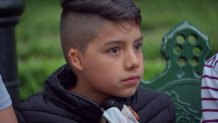
"I'm concerned he may lose his hearing," Fabiola told NBC 5 Investigates in Spanish, her eyes welling with tears, when we interviewed her in September. "And also, because kids laugh at him because of his ear."
To receive government health services in Mexico, Giovanni must have a copy of his Texas birth certificate, along with an apostille, which is an international form confirming authenticity. With those documents in hand, Giovanni could begin the process of getting dual citizenship, but Fabiola told us at the time that she requested her son's Texas birth records about nine months ago and the state had still not responded.
Giovanni is far from the only U.S.-born child who has been turned away because of the bureaucratic red tape that stretches from the United States to Mexico.
"Absolutely, that's really what it is," said Giovanni's family attorney, Helen Kerwin.
Kerwin is a Plano-native who moved to Mexico City where she works for a nonprofit, IMUMI, that helps parents retrieve U.S. birth certificates for their children.
"Generally, families … come to us because they've been trying for years to get the issue resolved and they haven't managed to do it on their own," she told NBC 5 Investigates and Telemundo 39.
Kerwin said it can take months for parents to even apply for the U.S. records because they often hit one roadblock after another, including learning of missing paperwork they must have or struggling to find American notaries or money orders -- a rarity in Mexico -- that are essential to complete the application properly.
In addition, the mounting costs to apply can be more than poor families can handle. It can be even more difficult when the child was born in Texas, according to advocates who try to help the families in Mexico.
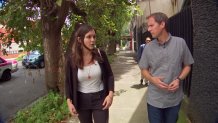
Vital records officials in Texas, "are currently delayed three or four months in just issuing a standard birth certificate," Kerwin said. "We have a request for a birth certificate correction that's been in since January of this year and we still haven't heard anything." (Kerwin's interview was held in September 2019)
Kerwin said many families could access records quickly if Texas used a proven system called EVVE (pronounced Eve), or Electronic Verification of Vital Events, which streamlines the process of authenticating U.S. birth records and eliminates the need for an apostille by allowing Mexican officials to instantly verify American birth records.
Since our interview in Mexico City in September 2019, the camera-shy boy, Giovanni, has since received his Texas birth certificate after waiting about 10 months. His mother said he's still struggling to hear and his attorney, Helen Kerwin, said that the wait contributed to him not getting the medical help he needs.
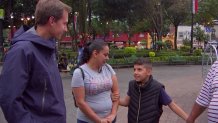
"The extra months that we wait for documents from Texas really do impact the lives of these kids," Kerwin said.
Student Awaiting Texas Documents Kicked Out of Mexican School
Jackie Cervantes, who now lives in the small Mexican town of San Ciro de Acosta, was born at Parkland Memorial Hospital in Dallas and lived in Terrell until her father returned to Mexico to help run a family business.
She is now 15 and dreams of becoming a doctor. Those dreams, for now, are on hold while she and her family try to untangle the bureaucratic logjam that leaves her feeling like she is without a country to call home.
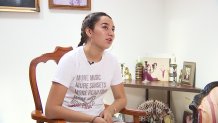
Jackie had planned to study science at her new school in Mexico, but she told NBC 5 Investigates she was kicked out because they didn't have a copy of her Texas birth certificate. Without it, school officials said she cannot attend the science-based school and her prior grades might not count because they have no way to confirm her identity.
Her dilemma mirrors other children in and around the state of San Luis Potosí where, at the regional office of migrant affairs, there sat a stack of 70 birth certificates for Texas-born children who are now living in Mexico. All of the certificates were received in just one week, but all are useless until Texas provides the apostilles needed to authenticate them.
Migrant affairs officials in San Luis Potosí have taken the unusual step of hiring a Texas law firm to help local families get the apostilles -- a costly and timely move that would not have been necessary if Texas participated in the EVVE system.
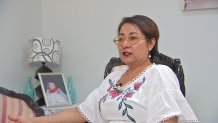
In the months that followed our interview with Cervantes, she finally received her Texas birth certificate with the help of a family friend in Houston, but with the school year slipping by she had to enroll in another school that does not offer the science-based classes she wanted. Jackie's mother, Yolanda Cervantes, said it was their third attempt to get her daughters' birth certificate and that on previous attempts they had difficulty understanding the documentation Texas required to complete the application. And, on one occasion, they said the state simply denied the request.
Yolanda described the process as a "nightmare" and said for a time the family felt completely in the dark about where to seek help in obtaining the records.
Deported From Texas, Man Creates Charity to Help Deported Families in Mexico
Jose Lira founded a charity that helps deported families adjust to life in Mexico. He was deported from Texas after issues with his green card status and said he's battled to get his teenage daughter's birth records.
Lira said the state of Texas took almost five months just to respond to letters and that the waiting and the lack of ID added to his daughter's feeling that she just didn't belong as she tried to adapt to a new country.
"She was under extreme depression, I mean, for the whole summer of last year. It was nothing but depression," Lira said, adding that more families face similar situations every day.
Just in the Mexican state of San Luis Potosí, more than 7,000 people deported from the U.S. will arrive this year and most of those people are coming from Texas, Lira said.
There are no resources and the problem is growing and growing and growing, he said..
As one mother and daughter told NBC 5 Investigates, "these paperwork nightmares can inflict scars that last years."
Pamela Cruz, a researcher at Rice University, said children in this situation can experience profound emotional affects.
"It's very sad, I think, for the kids to not be able to assimilate correctly into Mexico," Cruz said. "There's a bit of a culture clash-- they face a lot of challenges and a lot of coping."
Cruz said research suggests in recent years more Mexican nationals are leaving the U.S. than entering, many taking their American born kids with them back to Mexico. That means there may even more children who are "invisible" to the system.
EVVE Ready To Go in Texas With the Flip of a Switch
The Mexican government has used EVVE to quickly validate more than 76,000 birth certificates of kids born in 41 other U.S. states, according to Anthony Stout, of Dallas, the top manager of EVVE.
It would be "extremely helpful" if Texas used EVVE as well, Stout said, adding that this state could do it at any time, because the necessary equipment is already installed.
"Texas does already have the EVVE system fully installed on their servers. So they are able to flip a switch and turn on EVVE at this time," Stout said in an interview at the Fort Worth station for NBC 5 Investigates and Telemundo 39. "It is ready to go and they haven't yet turned it on and me, from where I sit, I can't tell why that is but I stand ready to work with them when they're ready to flip that switch."
Stout said the use of EVVE has been life-changing for some families in Mexico who needed to get timely access to identity information and that EVVE can provide that information in seconds.
"It's extremely important that we bring Texas on. They're obviously one of the largest states in the United States and they're a border state so they have a large stake in this project. I do know that Texas does understand that RENAPO (Registro Nacional de Población) needs access to this," Stout said.

Why Isn't Texas Using EVVE? NBC 5 Investigates Asks Texas Health Commissioner
John Hellerstedt is the commissioner of the Texas Department of State Health Services (DSHS). He is an Austin pediatrician and was appointed to his position at state health department by Texas Gov. Greg Abbott (R).
Hellerstedt repeatedly declined NBC 5 Investigates' requests for an interview to find out why the EVVE switch has not been turned on. So, we caught up with Hellerstedt at an event in Austin where we asked about the Texas-born kids living in Mexico who are struggling to get their birth records from his agency.
"We're working as hard as we can to fix that problem," he said. When asked further about the delays, Hellerstedt responded: "It's a difficult process. We have had a backlog for a considerable amount of time and it is taking us time to make that backlog go away."
Internal records obtained by NBC 5 Investigates and Telemundo 39 show that in one year the backlog grew from 26,000 pending requests for records to 66,000 and that it takes Texas an average of nearly four months to answer mailed-in requests for birth certificates, far longer than the agency's turn-around goal of 1 1/2 months. Hellerstedt said he recently got funding to increase the staff that handles those requests, but he declined to say whether Texas will join the other 41 U.S. states using EVVE.
"We are now in a position to re-evaluate again whether we are going to participate in that system," Hellerstedt said.
First, Hellerstedt added, the state needed to update its own records system. That update has now been completed, but Hellerstedt said he wants more time to evaluate the security of the data in the EVVE system. In the meantime, his office said Mexican officials could utilize the "vital records" section of the Texas.gov website to request electronic records more quickly -- but in recent weeks the state's own website said even those "processing times average two months."

Kerwin added that sometimes it feels the delays are a way of punishing Mexican parents, many of whom had children while living undocumented in the United States. She noted that the kids who need help in Mexico are Texans as well.
"We are talking about dual-nationality kids. Both countries should have an interest in their well-being," she said. "And yet they fall through the cracks."
When asked if the delays were punitive, Hellerstedt replied, "Absolutely not!" He said he just needs more time to determine whether EVVE is in the best interest of Texans.
Legislators to Step-In, Help Fix Document Logjam?
Following the investigation by NBC 5 Investigates and Telemundo 39, the Mexican American Legislative Caucus in Texas is urging Abbott's administration to fix the identity document logjam.
State Rep. Rafael Anchia (D-Dallas), who heads the caucus of about 40 members of the Texas House, said federal courts have repeatedly found Texas discriminated against Hispanic voters with restrictive voter ID requirements and that Texas has a history of putting roadblocks in front of children born to immigrants who need their birth records.
Anchia said, "the bottom line is Texas should always be number one and not lagging behind" other states that have implemented the EVVE system. "We need to be getting Texans, as these kids are, their birth certificates as quickly and painlessly as possible. It's not acceptable. It's clearly a failure of state government."

"Since 2016, we've seen attacks on the Hispanic community from the federal level and the state level," Anchia said. "So it doesn't surprise me that the state is trying to make it harder for these Texans, by the way, who may be of Mexican parents, to get their birth certificate."
"It's embarrassing to see American children suffering the way they do in Mexico," Anchia said.
Anchia added Mexico is also to be blame for the paperwork logjam that is keeping Texas-born kids out of the classroom and away from the healthcare they need and is imploring officials in Mexico to ensure that kids are not blocked from health care, or delayed in getting their education, while they wait for their birth records from Texas.
"That to me is immoral and it's a big failure on the part of the Mexican government," Anchia said.
After hearing what NBC 5 Investigates uncovered, Anchia and the Mexican American Legislative Caucus wrote Hellerstedt urging him to immediately adopt the EVVE system. In a reply to lawmakers, Hellerstedt said he planned to complete his review of the EVVE system within three months.
'No Political Will' to Change, Researcher Says
Tony Payan, an associate professor at Rice University who has studied the kids in Mexico known as "The Invisibles," said politics are the reason Texas is the only border state not using EVVE.
"In the case of Texas, I think we can safely assume that there is a lack of good faith," Payan said.
Payan feels there is an element of resentment within state government because many of the children were born to parents living undocumented in the United States.
"There is no political will," Payan said, adding: " … there is a certain hostility toward the immigrant population and so I think that the Texas leadership does not want to participate in this."
Payan said Texas has a track record of making the process hard. In 2013 a group of Mexican parents living in Texas sued the state health department after records offices denied birth certificates to parents who could could not prove they were in the U.S. legally.
The parents had to show a Mexican passport with a valid U.S. Visa.
In court the Texas Attorney General argued those children didn't really need their birth certificates to get services in Texas. The families disagreed. In 2016 the state settled the lawsuit allowing parents to present a Mexican ID card instead, one they can get from a Mexican consulate.
That lawsuit was filed before Hellerstedt was appointed state health commissioner. When we approached him in Austin, he denied that his decision to delay the EVVE system was designed to make things harder for undocumented parents and asserted the backlog and delays were due to the large volume of requests.
Payan said if there is a strategy to punish immigrant families it's the children who end up hurt most. In this case, those children are U.S. citizens who are legally entitled to their records.
"Well, I think it's inhumane. That is the U.S. law. That is the U.S. Constitution. That is the 14th Amendment," Payan said.
But the 14th Amendment's guarantee of birthright citizenship has come under some attack recently. In the 2016 presidential race, then-candidate Donald Trump suggested children born to undocumented immigrants are not really citizens when he said on FOX's Bill O'Reilly show, "I would much rather find out whether or not anchor babies are actually U.S. citizens. Bill, I don't think they have American citizenship. And if you speak with some very, very good lawyers. And I know some would disagree, but many of them agree with me, you are going to find they do not have American citizenship. We have to start a process where we take back our country. Our country is going to hell."
Mexican officials, meanwhile, told NBC 5 Investigates that children should be able to get a temporary ID number, and attend any school, while they wait for their documents.
But our investigation found that is not happening at all of the schools throughout the country. The agency in charge of immigration in Mexico cancelled a scheduled interview with NBC 5 Investigates and Telemundo 39, and it has not responded to our subsequent requests for comment.
In some cases, children are told that if they do not have their birth records and a CURP they will not receive credit for school courses. Without those records, officials said, they cannot upload grades into the government's system.
Texas Gov. Greg Abbott's office has not responded to multiple requests for comment. Meanwhile, the Mexican government currently estimates as many as 30,000 children living in Mexico do not have all of their birth or school records from the United States.
Boy, 9, Told He 'Didn't Belong,' Was 'Invisible'
In a different part of Mexico City, another U.S.-born boy, 9-year-old Isaiah Cruz, was once an outcast but is now back in school.
"That hurted really, my feelings," Isaiah told NBC 5 Investigates, recalling how he felt when he was told he "didn't belong" at his school in working class Ixtapaluca on the outskirts of Mexico City.
Isaiah was born in North Carolina, but moved to Mexico when his father, Indalecio Cruz, was deported. Small mistakes in his grammar as he transitions mid-sentence between English and Spanish are a reminder of how the boy is transitioning to life in Mexico.
Like some children from Texas, Isaiah's family said he was treated as if he was "invisible," with no country to call home and no classroom to go to because he doesn't have a fully-certified copy of his U.S. birth certificate, a necessity when pursuing dual citizenship.
On Isaiah's birth certificate, his two last names are reversed. It's typical in Latin American countries to have two surnames where the father's first surname is first and the mother's first surname is second. Those names being out of order is a mistake that occurs sometimes in U.S. hospitals. To correct the error Isaiah must seek a court order in North Carolina and obtain a certified copy of his birth records in order to begin the process of getting dual citizenship and a CURP, Mexico's equivalent of a U.S. Social Security number.
Cruz's father, meanwhile, is working to save up enough money to apply for copies of his son's birth records in North Carolina while paying off medical bills they've racked up because his son isn't eligible for government health care. Once that happens, Isaiah can then apply for dual citizenship in Mexico.

In recent weeks things have improved for Isaiah thanks to a new school where administrators assisted him in getting a temporary Mexican ID number that allows him to attend class.
The school Isaiah used to attend has a new director who told us he does not know what was said to Isaiah in the past, but confirmed students do need their birth certificate and a CURP to register at the school. In the future the director said he would tell staff to treat everyone like they belong.
"The new school that I'm going to," Isaiah told NBC 5 Investigates, "they don't tell me that I'm invisible anymore. And I like that."
Previous Reports
- ‘The Invisibles’: Texas Born Kids in Mexico Suffer Paperwork Nightmare
- Put-Off in Texas, ‘Invisible’ in Mexico, That’s No Way to Treat Kids, Lawmakers Say
NBC 5's Jack Douglas Jr., Frank Heinz and Dominga Gutierrez contributed to this report.
